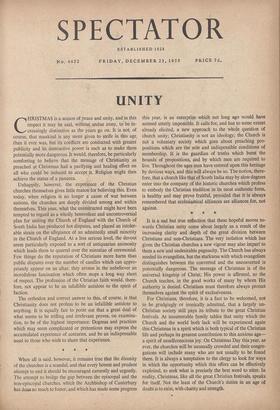UNITY
cHRISTMAS is a season of peace and unity, and in this respect it may be said, without undue irony, to be in- creasingly distinctive as the years go on. It is not, of course, that mankind is any more given to strife in this age. than it ever was, but its conflicts are conducted with greater publicity and its destructive power is such as to make them potentially more dangerous. It would, therefore, be particularly comforting to believe that the message of Christianity as preached at Christmas had a pacifying and healing effect on all who could* be induced to accept it. Religion might then achieve the status of a panacea.
Unhappily, however, the experience of the Christian churches themselves gives little reason for believing this. Even today, when religion is no longer a cause of war between nations, the churches are deeply divided among and within themselves. This year, what the uninstructed might have been tempted to regard as a wholly benevolent and uncontroversial plan for uniting the Church of England with the Church of South India has produced hot disputes, and placed an intoler- able strain on the allegiance of an admittedly small minority in the Church of England. At a less serious level, the devout seem particularly exposed to a sort of antiquarian animosity which leads them to quarrel over the minutiae of ceremonial. Few things do the reputation of Christians more harm than public disputes over the number of candles which can appro- priately appear on an altar; they arouse in the unbeliever an incredulous fascination which often stops a long way short of respect. The profession of the Christian faith would, there- fore, not appear to be an infallible antidote to the spirit of faction.
The orthodox and correct answer to this, of course, is that Christianity does not profess to be an infallible antidote to anything. It is equally fair to point out that a great deal of what seems to be trifling and irrelevant proves, on examina- tion, to be of the highest importance: Dogmas and practices which may seem complicated or pretentious may express the accumulated experience of centuries, and be an indispensable asset to those who wish to share that experience.
When all is said, however, it remains true that the disunity of the churches is a scandal, and that every honest and prudent attempt to end it should be encouraged earnestly and urgently. The attempt to bridge the gap between the episcopal and the non-episcopal churches, which the Archbishop of Canterbury has done Fo much to foster, and which has made some progress this year, is an enterprise which not long ago would have seemed utterly impossible. It calls for, and has to some extent already elicited, a new approach to the whole question of church unity; Christianity is not an ideology; the Church is not a voluntary society which goes about preaching pro- positions which are the sole and indispensible conditions of membership. It is the guardian of truths which burst the bounds of propositions, and by which men are required to live. Throughout the ages men have entered upon this heritage by devious ways, and this will always be so. The notion, there- fore, that a church like that of South India may by slow degrees enter into the company of the historic churches which profess to embody the Christian tradition in its most authentic form, is healthy and may prove fruitful, provided that it is always remembered that ecclesiastical alliances are alliances for, not against.
* « * It is a sad but true reflection that these hopeful moves to- wards Christian unity come about largely as a result of the increasing clarity and depth of the great division between Christians and non-Christians. The very isolation which has given the Christian churches a new vigour may also impart to them a new and undesirable pugnacity. The Church has always needed its evangelists, but the starkness with which evangelism distinguishes between the converted and the unconverted is potentially dangerous. The message of Christmas is of the universal kingship of Christ; His power is affirmed, so the Church teaches, in the good works of many by whom His authority is denied. Christians must therefore always protect themselves against the spirit of exclusiveness.
For Christians, therefore, it is a fact to be welcomed, not to be grudgingly or ironically admitted, that a largely un- Christian society still pays its tribute to the great Christian festivals. At innumerable family tables that unity which the Church and the world both lack will be experienced again this Christmas in a spirit which is both typical of the Christian life and perhaps its greatest contribution to this anxious age— a spirit of unselfconscious joy. On Christmas Day this year, as ever, the churches will be unusually crowded and their congre- gations will include many who are not usually to be found there. It is always a temptation to the clergy to look for ways in which the opportunity which this offers can be effectively exploited, to seek what is precisely the best word to utter. In reality, Christmas, like all the great Christian festivals, speaks for itself. Not the least of the Church's duties in an age of doubt is to exist, with charity and strength.


































 Previous page
Previous page